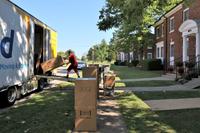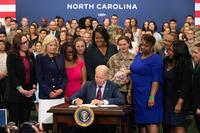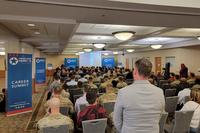The military can be a difficult lifestyle for a family, but it does come with some excellent benefits. Some of those are in the form of cash, and some are in the form of discounts. In addition to the bi-monthly paycheck, military service members receive benefits like money for housing, subsidized groceries and healthcare.
Don't know exactly how to get your military spouse and family benefits or want to know more about what they are? Read on.
First, make sure you can access your benefits.
To receive any military benefits, military family members must be registered in the military's personnel system, the Defense Enrollment Eligibility Reporting System (DEERS), and receive a military ID card. To do that you need to be the service member's spouse or child.
Certain other family members can also receive ID cards in some circumstances.
Need to get an ID card? This tutorial will help you learn how.
Military Pay
Every military service member receives at least a base pay. Most also receive a variety of allowances, special pays and bonuses depending on things like deployment, paygrade and military job. For most married service members, those allowances include Basic Allowance for Subsistence (BAS) and Basic Allowance for Housing (BAH).
Guard and Reserve pay work a little differently. Read more about that here.
An easy way to figure out your service member's pay, regardless of branch of military service, is by using the Military.com pay calculator. You can also download the calculator as an easy-to-use app for iOS or Android.
If you're confused about what your service member is currently getting paid, you can view his or her Leave and Earnings Statement (LES). The LES can look confusing and complicated, but we've got a simple tutorial to walk you through it.
Military Spouse and Family Healthcare
Active-duty military families -- regardless of which branch of service their spouse serves in -- receive benefits through the military's healthcare, which is called Tricare. While Tricare is technically not an insurance company, it often operates a lot like one, helping military families receive healthcare and pay medical bills.
There are two kinds of Tricare that active-duty families, medically retired families and families of activated guardsmen and reservists can use: Tricare Select (previously known as Tricare Standard) and Tricare Prime. You can learn about the differences between them here.
If you are a non-activated guard or reserve family, you can still use Tricare under the programs designed specifically for you. Learn more about them here.
Military retiree families can also receive Tricare. They use this set of Tricare programs.
Dental insurance is provided to military families through United Concordia . You can learn more about United Concordia dental coverage here.
Military Basic Allowance for Housing (BAH)
Basic Allowance for Housing (BAH) is given to every active-duty service member as part of their bi-weekly pay. How much you receive is usually based on where your service member is stationed. Even if you choose to live somewhere other than his duty station while he is home or deployed, you will still receive BAH based on duty station, not your residence.
In some cases, your service member may be stationed somewhere you cannot go -- called a "hardship duty assignment." If that happens, you may be able to receive BAH based on wherever you choose to live instead of where he is stationed.
By law, BAH is meant to cover 95 percent of your housing costs, minus renters insurance. The BAH rates are recalculated every year. If the rates go down where you are living, you will be grandfathered into the older, higher rate. If the rates go up where you are living, you'll receive the new, higher amount.
Want to know how much BAH you are currently receiving? The Military.com pay app makes figuring it out easy on iOS or Android.
Military Shopping Benefits
Known as "non-monetary compensation," military shopping benefits help military families save money on the things they want or need.
Most bases worldwide are home to a military commissary operated by a government organization called the Defense Commissary Agency (DeCA). Commissaries can often help military families save money on grocery items, since stores are required by law to sell items at cost. Check out this commissary 101 for more information on commissary shopping.
Most bases are also home to a department store called an exchange, as well as gas stations, liquor stores and fast food. On Army and Air Force bases, all of those places are run by the Army and Air Force Exchange Service (AAFES). On Marine Corps bases, they are run by the Marine Corps Exchange (MEX), and on Navy bases, they are run by the Navy Exchange (NEX). All of those companies operate independently of the military but use a percentage of their revenue to fund other military family programs. Most items purchased in the exchanges are tax exempt, making those stores great places to buy big-ticket items like electronics and furniture.
Related: Top Credit Cards for Military Members
The best credit cards for military personnel provide unique rewards in recognition of their service. Research and compare the top credit cards for military members here.
Military Childcare
Most military bases have a variety of full-time or hourly daycare centers. The costs of these are based on a family's total income, not just the service member's paygrade. Waiting lists at these centers can be long, so the military also allows families to use subsidized in-home daycares that have been officially approved. If you don't live near a base or there are no on-base daycare center spots available, the military will also subsidize the cost of care at certain off-base, civilian daycares that have become a part of their network.
Finding military childcare can feel difficult, but this tutorial can help you.
Military Recreation Benefits
Military Welfare and Recreation (MWR) is a major part of base life -- and a part of your benefits. The programs MWR funds and manages on base are often much more affordable than their off-base counterparts because the government subsidizes their costs.
MWR manages most recreation on every base, including gyms, pools, bowling alleys, horse stables, event centers, golf courses, discounted equipment rentals and more. Many bases also have available youth programs operated through MWR like dance classes, sports teams and clubs. Since most of these services are specific to each base, you should contact your local MWR office to learn what is available.
MWR operates several resorts in vacation destinations around the world. And the individual services' MWR programs operate recreation areas stateside in places like Virginia Beach, Virginia; Fort Walton Beach, Florida; and Pacific Beach, Washington. The best way to find out what is currently available from that program is to contact your base MWR office.
Keep Up with the Ins and Outs of Military Life
For the latest military news and tips on military family benefits and more, subscribe to Military.com and have the information you need delivered directly to your inbox.























